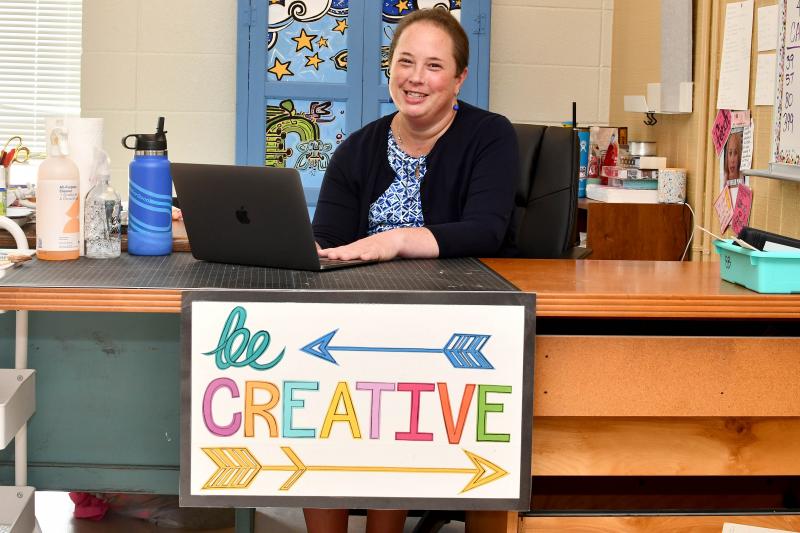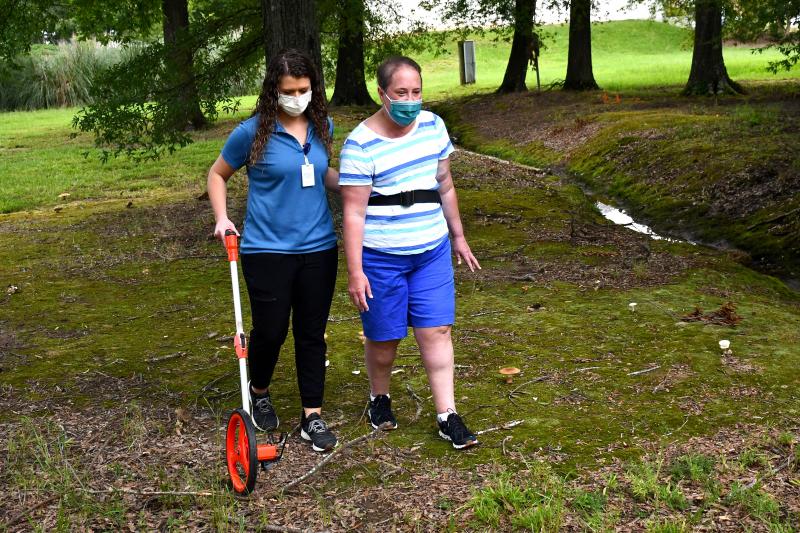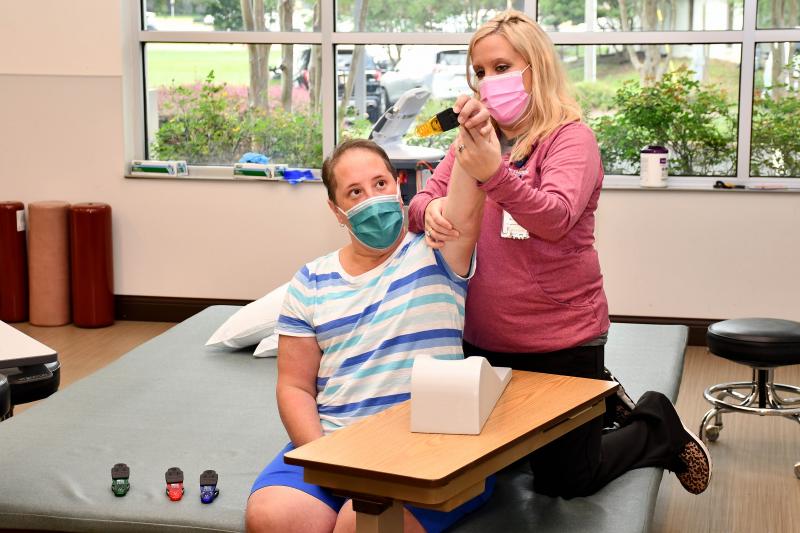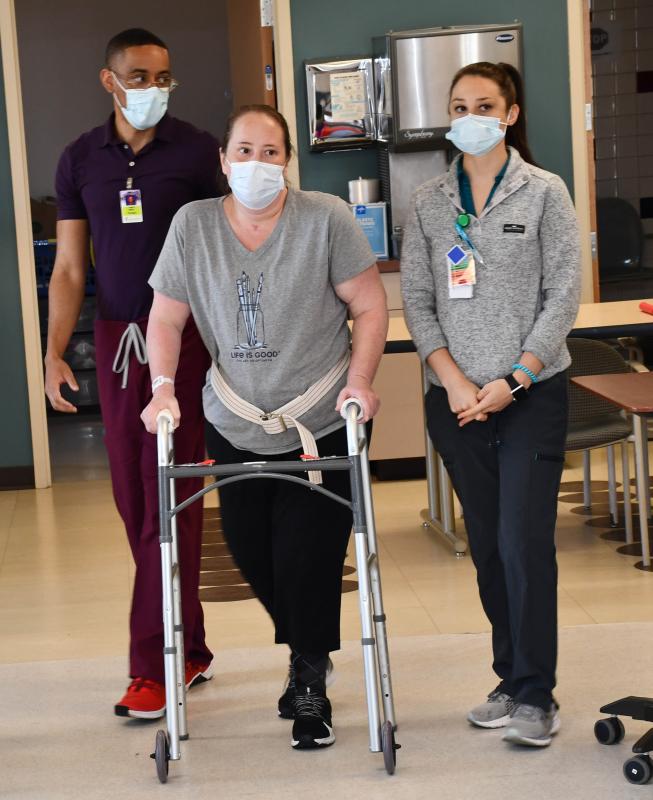On Aug. 6, first-day jitters were in full bloom at Northwest Rankin Middle School in Brandon.
Everyone from students to staff were getting their bearings in a new building. And the adjustment had to be particularly arduous for eighth-grade art teacher Juliette Collier.
It was her first day back at work since a severe case of COVID-19 nearly killed her. At one point, her mother, Weezie Polk, was told: “You need to come see her, she’s probably not going to make it.”
Today, the 45-year-old single mom bears the souvenirs of that battle. She walks slowly, talks hoarsely and struggles to use her nerve-damaged left hand. Plus, every morning she uses a lint roller to remove clumps of hair from her pillow—another fallout of COVID-19.
Still, she’s grateful to return to teaching and gives credit to staff at Methodist Rehabilitation Center in Jackson for helping her achieve that goal.
“I told them I wanted to walk, to take care of my son and go back to work,” she said. “And I would not be where I am now if not for the doctors, therapists, nurses and techs. They knew what I needed to do to get where I wanted to be. Everyone cared about me as an individual, not just someone else on their roster.”
As a classroom teacher, Collier recognized she was at risk for COVID-19. Yet she never imagined the swiftness of her decline. Within a week of first feeling ill, she was on life support.
On Feb. 3, she arrived at St. Dominic’s ER in Jackson gasping for air. She’d been there a few days before with a racing heart and shortness of breath and tested positive for COVID-19. But since she didn’t have pneumonia, she was sent home with medication.
This time, though, her oxygen saturation level was dangerously low and her blood sugar too high.
“They said you have uncontrolled diabetes, but I didn’t,” Collier said. “I really think that was COVID. The last thing I remember is a nurse bringing me a pudding. After that, I don’t remember anything until March 13.”
To keep her from pulling out a breathing tube, feeding tube and chest tube, Collier was heavily sedated for over a month. “I had some crazy dreams,” she said. “I went to Wakanda. They took me there to heal me.”
When she woke up, real life didn’t provide the medical marvels of a Black Panther movie. But at MRC, Collier was met by a staff already well-versed in post-COVID rehab protocols.
Everything she experienced—from extreme weakness and foot drop to nerve damage and erratic oxygen levels—they’d already addressed in previous patients.
Still, it was all new to Collier. And when she arrived at MRC’s hospital on April 24, she doubted she was ready for 18 hours of therapy each week.
“When I got there, I was scared to death,” she said. “I thought: ‘What are they going to make me do?’ I had so much anxiety, which apparently is also a COVID thing.”
Her concerns were understandable. After almost three months of being bed-bound, “I was such a noodle,” she said. “It took two therapists and an overhead harness to help me up.”
Collier also was struggling with the loss of her independence and time away from her 15-year-old son, Wyatt. So in the interest of his mom’s recovery, Wyatt got to visit her in the therapy gym.
“We used that as a motivator and it really, really helped,” said physical therapist Kayla Embry. “We’d say, ‘Your son is coming, and he’ll want to see you walk or stand.’”
“And she had a drastic change in mood after that,” said occupational therapist Audrey Page.
“It was like it turned a switch,” Collier said. “He was so happy about me coming home, and I was like: ‘Look at what I can do.’”
Collier dove into her therapy, practicing fine motor skills and self-care strategies with Page and pacing the halls with Embry. “Everybody was so positive,” Collier said. “Kayla would call me her star student.”
Collier also spent time with therapeutic recreation specialist Laura Jones, and the two connected over their shared love of art.
“When we were doing her initial evaluation, she told me she was a painter and was very concerned about that because of nerve pain in her hands and being so weak,” Jones said. “She wasn’t sure she could even hold a paint brush. So we just tried it.”
Soon, Collier was doing paintings, planning projects for her classroom and even teaching Jones a few tricks. “I even tried a new medium she taught me about,” Jones said.
“I was so happy to be able to paint and draw,” Collier said. “I want to do what I love to do.”
To that end, Collier decided to continue her rehab at Methodist Outpatient Therapy in Flowood. She knew she needed more help to develop the endurance and balance to stand for 90-minute class periods.
“When they first tested me, I could not tap the top of a box and I couldn’t do steps,” Collier said.
Now, she can walk without assistance and even balance on one leg while batting a balloon back and forth. But physical therapist Molli Sorrels said her movement still needs fine-tuning. A case in point is how Collier moves her arms while walking.
“She doesn’t have much arm swing, and it’s something that makes walking a lot more efficient,” Sorrels said.
In order to practice the skill, Collier was strapped into the clinic’s ZeroG Gait and Balance System. The overhead device keeps patients from falling as they practice advanced tasks, and it gave Collier the confidence to concentrate on her arm movement and learn to pick up her pace.
Occupational therapist Ashlee Ricotta focused on improving Collier’s hand and arm function, a common emphasis among post-COVID patients.
“We’ve noticed a lot of patients have hand weakness and wrist weakness,” Ricotta said. “Her shoulder is also more elevated and tight due to a lot of shortening of muscles from being in the hospital. And her bicep muscle still has limitations in function.”
While she continues to heal, Collier is using some compensatory techniques in her classroom—such as a microphone to amplify her weak voice.
Collier also has perfected the art of the one-arm hug, as she strives to express gratitude to all who came to her aid during a difficult time.
There was her dad, Eddie Polk, and her mom, who was forced to make difficult medical decisions and often sat by her bed singing hymns. The teachers who donated personal days for her sick leave. And the friend who took in her son and the other buddies who were caretakers for her house.
“The school also has been very helpful and caring and so supportive,” she said.
As school wrapped up in May, Collier said she stopped by for a visit and was overwhelmed by the response. “They all grabbed me and hugged me and it made me cry,” she said. “I love the people I teach with. I was so excited to go back.”
Looking back on her experience, Collier hasn’t forgotten the low points. “All of it was so hard, just sitting up in bed or brushing my teeth and letting other people take care of me. And at first, all I thought about was what I couldn’t do.
“But I’ve come through this, and now I think the things I thought were important are not important. Now spending time with my son and parents and at church is much more important. I think it has changed me in a positive way.”




